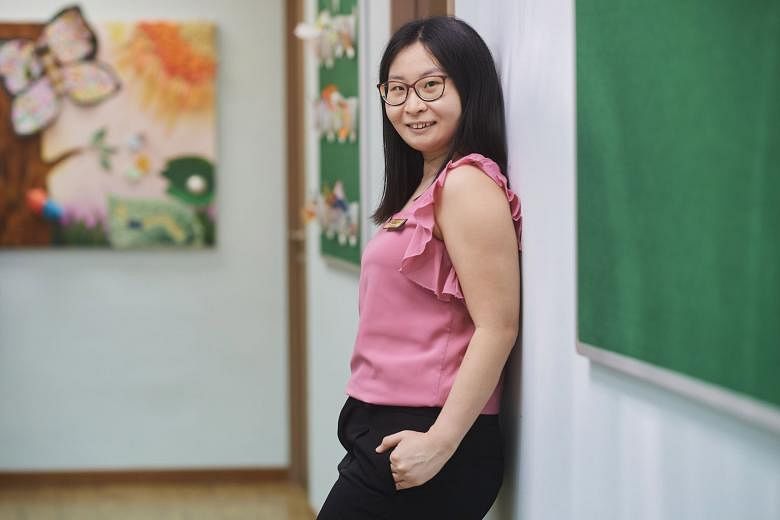As a final year student pursuing a Bachelor of Psychology (Honours) at James Cook University (JCU) Singapore, Ms Rebecca Yeo had her eye on a career in neuropsychology.
But while observing and analysing youth at family service centres and secondary schools for her final year project, she became intrigued by special needs education.
"I realised that some of the youth faced immense difficulty in learning despite trying their best to pay attention in class and working hard," she recalls.
Moved by their struggle, she decided to delve deeper into special needs education and use the knowledge from her degree to help students with dyslexia learn better.
Upon her graduation from JCU in 2011, Ms Yeo volunteered at a private special needs school before joining the Ministry of Education as an Allied Educator in 2010, and then the Dyslexia Association of Singapore (DAS) as an educational therapist in 2011.
Deeper connections
Now a lead educational therapist at DAS, Ms Yeo teaches mathematics to primary school students and nurtures their interest and understanding of the subject through dyslexia-friendly teaching principles and evidence-based teaching strategies.
She is also the programme manager for mathematics, and oversees programme and curriculum development, research, student profiling and conducting training sessions for teachers.
While Ms Yeo celebrates the achievements of her students, many of whom are talented in areas such as speech and drama, art and sports, she admits that the most challenging part of her job is managing their behaviour.
"Children with dyslexia struggle with reading, spelling, organisation, sequencing their thoughts, and working memory. Many also experience other specific learning differences (SpLDs) that co-occur with dyslexia, such as attention-deficit hyperactivity disorder (ADHD) and autism spectrum disorder (ASD). These challenges impact their academic performance and ability to make and maintain friendships. They are often misunderstood as being lazy or slow, and are easy targets for bullies in school," she adds.
Ms Yeo recalls a student who was transferred to her class. His former teachers gave her feedback that he was stubborn and would rather read than do maths. They had a difficult time trying to get him to enter their maths classroom and to complete their tasks.
Ms Yeo observed that the student was fascinated with war and highly knowledgeable about World War II. He enjoyed drawing pictures of soldiers and tanks on her whiteboard.
"I realised that I could use his interest to encourage him to do maths. I provided him with the opportunity to draw as a reward for doing my work, and also included a few breaks during my lesson to better sustain his attention," she says.
After working with him for a few months, he started showing up for classes on his own, sometimes even before the lesson began. His attention span also improved from 20 minutes to 40 minutes. His grades improved as well, and he became a much happier child, Ms Yeo says.
"I was really happy that I had made a difference in his learning journey," she adds.

Applying knowledge
In her nine years at DAS, Ms Yeo has many more stories to share about students who have overcome their learning challenges.
DAS director of Specialised Educational Services Edmen Leong says her success can be attributed to the motivation she has for supporting her students.
"Rebecca is also a resilient leader who is able to make wise decisions for DAS. During the Covid-19 pandemic, she led the change to deliver our mathematics curriculum online. She also plays the role of a mentor to junior colleagues," he adds.
Ms Yeo credits her good work to her in-depth training in psychology at JCU.
"Even though the topic of learning differences was not part of my JCU programme, my studies exposed me to many motivational theories covered during our initial teacher training in DAS. I was able to identify my students' likes and dislikes and use them as motivators during my lessons. This kept them engaged during my lessons," she says.
Having grown in her roles at DAS, Ms Yeo still continues to use some of the theories she learnt during her JCU days to develop new teaching strategies. One example is Baddeley and Hitch's model of working memory.
"At DAS, I learned that individuals with dyslexia suffer from poor verbal working memory. Using Baddeley and Hitch's model of working memory, I explain to parents, allied educators, and new staff members what working memory is, reasons behind the poor retrieval of verbal information, and suggest helpful strategies such as using a multisensory approach," she explains.
She adopted this approach for a Primary 6 student in her class who was easily distracted, forgot quickly, and seemed to have difficulty understanding some of her instructions. Ms Yeo customised a set of learning materials specially for him so that he could learn at a pace he was comfortable with. She also adapted the lesson for the whole class so other students could work on tasks independently, while she had more time to help the weaker student. This resulted in a win-win situation; every student achieved the lesson objectives she had set for them.
As she enters the next decade of her career, Ms Yeo hopes to continue working with students with special educational needs, and to inspire them to be the best version of themselves.
She adds: "I also hope to help parents and teachers understand the educational needs of students with special needs. With more widespread understanding, we can create a more inclusive environment for students with dyslexia or other SpLDs, and enable curious learners to excel in their areas of interest at their own pace."
Visit psychology.jcu.edu.sg for more information on JCU's Psychology programme.

